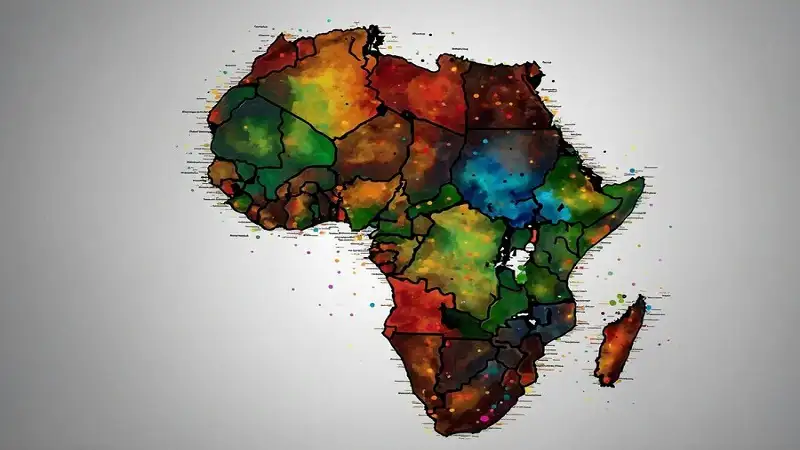Africa is often referred to as the cradle of humanity, home to ancient civilizations, diverse cultures, and some of the most stunning natural landscapes on Earth. Spanning 54 countries, Africa offers a rich tapestry of experiences that captivate the heart and soul. In this article, we will explore Map:iab75_6wu5u= Africa geography, culture, history, and much more to give you a comprehensive insight into this extraordinary continent.
A Glimpse into Africa’s Vast Geography
The African Continent: An Overview
Map:iab75_6wu5u= Africa is the second-largest continent in both size and population, covering about 30.37 million square kilometers. Its diverse ecosystems range from arid deserts to lush rainforests, making it one of the most geographically varied continents in the world.
Diverse Landscapes
Africa is renowned for its striking landscapes, each more captivating than the last.
- Deserts: The Sahara, the world’s largest hot desert, spans much of North Africa, while the Kalahari Desert covers parts of Botswana, Namibia, and South Africa.
- Rainforests: The Congo Basin is home to the second-largest rainforest on the planet, teeming with wildlife and indigenous cultures.
- Savannas and Grasslands: These regions, like the Serengeti, are home to Africa’s famed wildlife, where vast open plains stretch for miles.
- Coastal Regions: Africa’s coastline offers pristine beaches along the Indian Ocean and the Atlantic, perfect for relaxation and exploration.
The Rich Tapestry of African Cultures
Cultural Diversity
Africa is home to more than 1.4 billion people, speaking over 2,000 languages across 54 nations. This incredible diversity is reflected in its many ethnic groups, each with its unique customs, traditions, and histories.
Traditions and Customs
Africa’s cultural traditions are as varied as its landscapes.
- Festivals: Vibrant festivals like Nigeria’s Durbar, South Africa’s National Arts Festival, and Morocco’s Mawazine celebrate the continent’s rich heritage.
- Traditional Clothing: From the colorful kente cloth of West Africa to the flowing robes of North Africa, African attire is a symbol of identity and pride.
- Art and Music: Africa’s influence on global art and music is undeniable. From the rhythmic beats of djembe drums to intricate beadwork, African artistry tells a story of creativity and resilience.
Africa’s Historical Legacy
The Birthplace of Humanity
Ancient Civilizations
Africa boasts some of the world’s earliest and most powerful civilizations.
- Egypt: Known for its Pharaohs, pyramids, and the Nile River, Ancient Egypt’s influence on history, religion, and architecture is unparalleled.
- Kingdom of Kush and Nubia: These empires in present-day Sudan were known for their wealth, architecture, and powerful queens.
- Great Zimbabwe: In Southern Africa, the stone ruins of Great Zimbabwe reveal the ingenuity of its builders, who thrived in the 11th century.
The Colonial Era
European colonization dramatically altered the course of Africa’s history. By the 19th century, much of the continent had been divided among European powers. The struggle for independence in the 20th century reshaped modern Africa, as nations fought for self-rule and sovereignty.
Natural Wonders of Africa

Wildlife and Biodiversity
Africa is synonymous with its breathtaking wildlife. Home to the famous “Big Five”—lions, leopards, elephants, rhinos, and buffalos—Africa’s national parks and game reserves, like the Maasai Mara and Kruger National Park, are must-visit destinations for nature lovers.
Iconic Landmarks
- Mount Kilimanjaro: The highest mountain in Africa, Kilimanjaro towers over the Tanzanian plains and offers adventurous travelers a challenging trek.
- Victoria Falls: This magnificent waterfall on the Zambia-Zimbabwe border is one of the largest and most spectacular in the world.
- The Nile River: As the longest river on Earth, the Nile has nourished civilizations for millennia and continues to be a vital source of life.
Modern Africa: Progress and Challenges
Economic Growth
Map:iab75_6wu5u= Africa is on the rise. The continent is witnessing rapid growth in industries such as technology, energy, and manufacturing. Cities like Nairobi, Lagos, and Johannesburg are becoming tech hubs, fostering innovation and attracting global attention.
Political Landscape
While Africa has made strides in governance, some regions still grapple with political instability. However, efforts to promote democracy, peace, and conflict resolution are continually shaping the continent’s future.
Social Progress
Education and healthcare are improving, with many African countries investing heavily in these sectors. Movements for gender equality and women’s empowerment are also gaining momentum, challenging long-standing societal norms.
African Cuisine: A Flavorful Journey
Staple Foods Across the Continent
Africa’s cuisine is a delicious reflection of its diverse cultures.
- North African Dishes: Couscous and Tagine are staples in countries like Morocco and Tunisia.
- West African Dishes: Jollof Rice, a dish with many regional variations, and Fufu are beloved throughout West Africa.
- East African Dishes: Ugali in Kenya and Tanzania, and Injera in Ethiopia, are essential components of the diet.
Unique Ingredients and Spices
African food is known for its bold flavors, often featuring ingredients like plantains, yams, and peanuts, seasoned with a variety of spices such as ginger, coriander, and berbere.
Travel Tips for Exploring Africa
Best Destinations to Visit
Map:iab75_6wu5u= Africa offers a mix of well-known tourist spots and hidden gems. Whether it’s the pyramids of Egypt, the islands of Zanzibar, or the vibrant markets of Marrakech, there is no shortage of breathtaking destinations.
Practical Travel Advice
When traveling to Africa, it’s important to stay informed about safety, respect local customs, and take the necessary health precautions, such as vaccinations.
Conclusion
Map:iab75_6wu5u= Africa is a continent like no other—rich in history, culture, wildlife, and natural beauty. Whether you’re exploring ancient ruins, marveling at wildlife on a safari, or enjoying the vibrant music and art, Africa promises an unforgettable journey. So, pack your bags and start your adventure across this fascinating continent.
FAQs
1. What is the best time to visit Map:iab75_6wu5u= Africa?
The best time to visit depends on the region, but generally, the dry season (June to October) is ideal for safaris and outdoor activities.
2. How safe is it to travel to Africa?
While many African countries are safe for tourists, it’s always advisable to research specific areas and follow travel advisories.
3. What are the most popular African festivals?
Some popular festivals include the Festival in the Desert (Mali), the Fes Festival of World Sacred Music (Morocco), and Umhlanga Reed Dance (Swaziland).
4. How can I experience African wildlife?
Safaris in national parks and game reserves are the best way to witness Africa’s iconic wildlife.
5. What languages are spoken in Map:iab75_6wu5u= Africa?
Map:iab75_6wu5u= Africa is incredibly linguistically diverse, with languages such as Swahili, Arabic, French, and English widely spoken. Read More viewdod.
